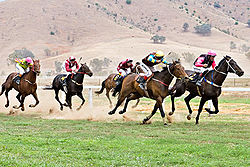
The Melbourne Cup is an annual Group 1 Thoroughbred horse race held in Melbourne, Australia, at the Flemington Racecourse. It is a 3200-metre race for three-year-olds and older, conducted by the Victoria Racing Club that forms part of the Melbourne Spring Racing Carnival. It is the richest two-mile handicap in the world and one of the richest turf races. The event starts at 3:00 pm on the first Tuesday of November and is known locally as "the race that stops the nation".

Thoroughbred racing is a sport and industry involving the racing of Thoroughbred horses. It is governed by different national bodies. There are two forms of the sport – flat racing and jump racing, the latter known as National Hunt racing in the UK and steeplechasing in the US. Jump racing can be further divided into hurdling and steeplechasing.
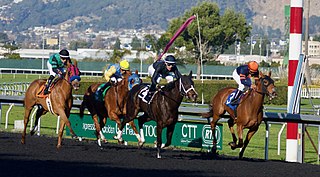
Horse racing is an equestrian performance sport, typically involving two or more horses ridden by jockeys over a set distance for competition. It is one of the most ancient of all sports, as its basic premise – to identify which of two or more horses is the fastest over a set course or distance – has been mostly unchanged since at least classical antiquity.

Thoroughbred horse racing is a spectator sport in Australia, and gambling on horse races is a very popular pastime with A$14.3 billion wagered in 2009/10 with bookmakers and the Totalisator Agency Board (TAB). The two forms of Thoroughbred horseracing in Australia are flat racing, and races over fences or hurdles in Victoria and South Australia. Thoroughbred racing is the third most attended spectator sport in Australia, behind Australian rules football and rugby league, with almost two million admissions to 360 registered racecourses throughout Australia in 2009/10. Horseracing commenced soon after European settlement, and is now well-appointed with automatic totalizators, starting gates and photo finish cameras on nearly all Australian racecourses.
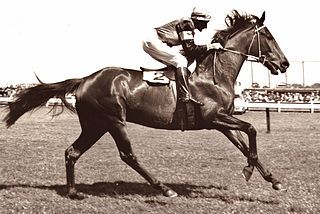
The Caulfield Cup is a Melbourne Racing Club Group 1 Thoroughbred horse race held under handicap conditions. This is for all horses aged three years old and older. It takes place over a distance of 2400 metres at the Caulfield Racecourse, Melbourne, Australia in mid October. The prize money is A$5,000,000.
The Spring Racing Carnival is the name of an Australian Thoroughbred horse racing series held annually in Melbourne during October and November.

A jockey is someone who rides horses in horse racing or steeplechase racing, primarily as a profession. The word also applies to camel riders in camel racing. The word "jockey" originated from England and was used to describe the individual who rode horses in racing. They must be light, typically around a weight of 100–120 lb., and physically fit. They are typically self-employed, and are paid a small fee from the horse trainer and a percentage of the horse's winnings. The job has a very high risk of debilitating or life-threatening injuries.

Easter Monday is the second day of Eastertide and a public holiday in some countries. In Western Christianity it marks the second day of the Octave of Easter; in Eastern Christianity it marks the second day of Bright Week.
In horse racing in Great Britain, France and Republic of Ireland, National Hunt racing requires horses to jump fences and ditches. National Hunt racing in the UK is informally known as "jumps" and is divided into two major distinct branches: hurdles and steeplechases. Alongside these there are "bumpers", which are National Hunt flat races. In a hurdles race, the horses jump over obstacles called hurdles; in a steeplechase the horses jump over a variety of obstacles that can include plain fences, water jump or an open ditch. In the UK, the biggest National Hunt events of the year are generally considered to be the Grand National and the Cheltenham Gold Cup.

A point-to-point is a form of horse racing over fences for hunting horses and amateur riders. In Ireland, where the sport is open to licensed professional trainers, many of the horses will appear in these races before they compete in National Hunt races. Consequently, the Irish point-to-point tends to be used as a nursery for future young stars: a horse that wins its debut point-to-point in Ireland will often sell for a high price. Whilst professional trainers are specifically excluded from running horses in point-to-points in Great Britain, the days of the farmer running his hunter at the local point-to-point are gone.. Increasingly, horses are run from "livery yards" - unlicensed but otherwise professional training establishments, sometimes closely allied with a licensed yard.
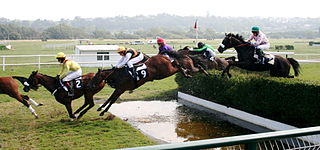
A steeplechase is a distance horse race in which competitors are required to jump diverse fence and ditch obstacles. Steeplechasing is primarily conducted in Ireland, Great Britain, Canada, United States, Australia, and France. The name is derived from early races in which orientation of the course was by reference to a church steeple, jumping fences and ditches and generally traversing the many intervening obstacles in the countryside.

Ted Walsh is an Irish amateur jockey turned racehorse trainer who was born and raised in County Cork but based in Kill, County Kildare, Ireland. Ted is also father to amateur Irish National Hunt jockey, Katie Walsh and professional national hunt jockey Ruby Walsh.

Oakbank is a town in the Adelaide Hills, east of Adelaide in South Australia. It is in the Adelaide Hills Council area. At the 2006 census, Oakbank had a population of 473.
The Oakbank Easter Racing Carnival is a horse-racing meeting held over two days by the Oakbank Racing Club at the Oakbank Racecourse located in the Adelaide Hills in South Australia. The carnival is a mixture of flat and jumping races, with two and four jump races on day one and two feature jumping races on day two.
The Great Eastern Steeplechase was an Australian Thoroughbred steeplechase horse race held annually at Oakbank, South Australia on Easter Saturday and Monday at the Oakbank Racecourse as part of the Oakbank Easter Racing Carnival. The first fixture of that name was held in 1877, following a race in 1876 which has been called the "Onkaparinga Handicap Steeplechase"; both just prior to formation of the Onkaparinga Racing Club.
The Grand Annual is an Australian Thoroughbred steeplechase for horses that run at Warrnambool, Victoria during its annual May Racing Carnival. The distance is officially listed as about 5500 metres because many sections of the race are run in open paddocks with little or no fences. The race is the longest horse race run in Australia on a public course. There are 33 obstacles, more than any other steeplechase in the world.
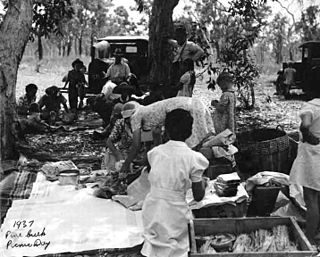
Picnic Day is a public holiday in the Northern Territory of Australia which takes place every year on the first Monday of August.

Oakbank Racecourse, also but less frequently known as the "Onkaparinga Racecourse", is home of the Oakbank Racing Club, a club which, until 2009, raced just twice annually, Easter Saturday and Easter Monday at the Oakbank Easter Racing Carnival, and has done continually since 1876, except during World War II when it was held at Victoria Park and Morphettville Racecourse due to the army taking over the facility.
Oakbank Racing Club, formerly the Onkaparinga Racing Club, is a thoroughbred horse racing organization in South Australia. It is responsible for the Oakbank Racecourse and running the events of the Easter Racing Carnival on that course, culminating in the Great Eastern Steeplechase.

James Hugh Bowman is an Australian thoroughbred racing jockey. Based in Sydney, Bowman has won the New South Wales Metropolitan Jockey Premiership four times and has ridden 100 Group 1 winners. He was the jockey for Australian champion mare Winx from 2014 through to her retirement in 2019. In 2017, Bowman won the Longines World’s Best Jockey award presented by the International Federation of Horseracing Authorities. The award capped off a year in which he added to his domestic success with international Group 1 wins in Hong Kong and Japan. In 2019, he was inducted into the Australian Racing Hall of Fame, the industry’s highest accolade. Bowman is also renowned for his “She’s Apples” winning salute and his nickname of “the Undisputed Group 1 King”.
